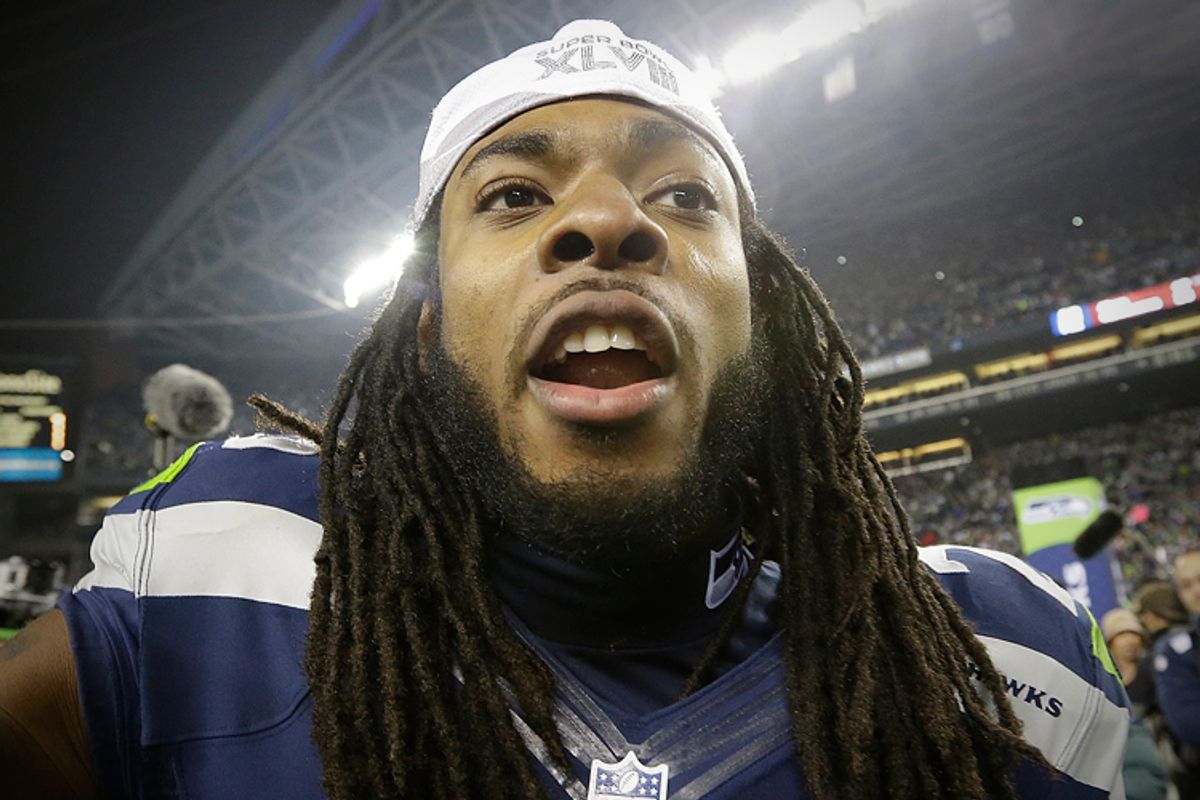Over the weekend, Richard Sherman lit up the Internet with a sideline interview completed after he helped the Seattle Seahawks clinch their spot in the Super Bowl. "Well, I'm the best corner in the game," he declared. "When you try me with a sorry receiver like [San Francisco 49er Michael] Crabtree, that's the result you're going to get. Don't you ever talk about me!"
Deadspin collected the predictable, dispiriting assemblage of racist tweets from those who'd watched the Seahawks game; a black man shouting on television will always be scary to some. But what was notable, here, was what Sherman didn't do. He didn't curse, or threaten anyone with anything except a loss, in the future. He seemed to be speaking from a prepared speech in defense of his own talents against anyone who'd challenge them. Isn't this exactly what football is about?
What do people who considered Sherman "classless" think that they had been watching for hours before? Football is a game in which strong men bash their heads into one another in order to gain ground; there's nothing about it that's particularly classy. Quarterbacks tend to dance in the end zone, unless they showily indicate they have a special bond with God that allows them to win. Sherman was making text what had been subtext -- that he and Crabtree (and the Seahawks and 49ers) were engaged in a game of oneupmanship that could only have one winner. To dismiss him is to pretend that football has some loftier purpose, that there are unwritten rules governing behavior after what is in every other of its particulars all about intimidation. Since when is that most violent of sports governed by notions of gentlemanly decorum? And who gets to make those rules, anyway?
As for the facts of Sherman's statement: Football, like all sports, is extremely straightforward. You win or you lose. The question of who is, over the course of the season, the best is quantifiable (even if some variables make this less-than-perfect). Sherman didn't, strictly speaking, need to say that Crabtree had failed to best him. But he was right. The phenomenon of someone being told to quiet down when expressing, openly, his ambition to be deemed the best after getting material rewards isn't unfamiliar. Kanye West was mocked throughout 2013 for expressing opinions that were as close to facts as opinions can be about the influence he has on music and fashion; his manner of delivery was unusual, but does anyone deny that he's an influential rapper in intangible and quantifiable ways? It's easier to ask him to shut up, because the degree to which he revealed every pop artist's desire for world dominance was deeply uncomfortable. The stakes in football, a sport for which players, in many cases, give their health, are even higher: Is it any wonder a player gave in to his anger at an opponent?
Sherman's speech was uncomfortable not for its manner of delivery -- surprise, a player just coming off the field is full of adrenaline -- but for what it revealed about how competitive people think. But as much as sportsmanship is a good value for children, the ability to cut through the cant surrounding a brutal sport is good for all of us. It was a shocking moment on live TV; all the better to point out that the ideas of "class" and "decorum" surrounding football are empty words, but the head-bashing violence of the sport is what brings in viewers.



Shares